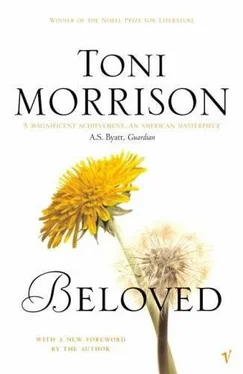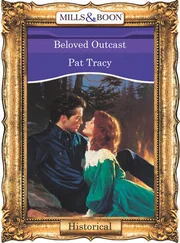When the last of the chamomile was gone, she went around to the front of the house, collecting her shoes and stockings on the way.
As if to punish her further for her terrible memory, sitting on the porch not forty feet away was Paul D, the last of the Sweet Home men. And although she she said, "Is that you?"
"What's left." He stood up and smiled. "How you been, girl, besides barefoot?"
When she laughed it came out loose and young. "Messed up my legs back yonder. Chamomile."
He made a face as though tasting a teaspoon of something bitter.
"I don't want to even hear 'bout it. Always did hate that stuff."
Sethe balled up her stockings and jammed them into her pocket.
"Come on in."
"Porch is fine, Sethe. Cool out here." He sat back down and looked at the meadow on the other side of the road, knowing the eagerness he felt would be in his eyes.
"Eighteen years," she said softly.
"Eighteen," he repeated. "And I swear I been walking every one of em. Mind if I join you?" He nodded toward her feet and began unlacing his shoes.
"You want to soak them? Let me get you a basin of water." She moved closer to him to enter the house.
"No, uh uh. Can't baby feet. A whole lot more tramping they got to do yet."
"You can't leave right away, Paul D. You got to stay awhile."
"Well, long enough to see Baby Suggs, anyway. Where is she?"
"Dead."
"Aw no. When?"
"Eight years now. Almost nine."
"Was it hard? I hope she didn't die hard."
Sethe shook her head. "Soft as cream. Being alive was the hard part. Sorry you missed her though. Is that what you came by for?"
"That's some of what I came for. The rest is you. But if all the truth be known, I go anywhere these days. Anywhere they let me sit down."
"You looking good."
"Devil's confusion. He lets me look good long as I feel bad." He looked at her and the word "bad" took on another meaning.
Sethe smiled. This is the way they were-had been. All of the Sweet Home men, before and after Halle, treated her to a mild brotherly flirtation, so subtle you had to scratch for it.
Except for a heap more hair and some waiting in his eyes, he looked the way he had in Kentucky. Peachstone skin; straight-backed.
For a man with an immobile face it was amazing how ready it was to smile, or blaze or be sorry with you. As though all you had to do was get his attention and right away he produced the feeling you were feeling. With less than a blink, his face seemed to change-underneath it lay the activity.
"I wouldn't have to ask about him, would I? You'd tell me if there was anything to tell, wouldn't you?" Sethe looked down at her feet and saw again the sycamores.
"I'd tell you. Sure I'd tell you. I don't know any more now than I did then." Except for the churn, he thought, and you don't need to know that. "You must think he's still alive."
"No. I think he's dead. It's not being sure that keeps him alive."
"What did Baby Suggs think?"
"Same, but to listen to her, all her children is dead. Claimed she felt each one go the very day and hour."
"When she say Halle went?"
"Eighteen fifty-five. The day my baby was born."
"You had that baby, did you? Never thought you'd make it."
He chuckled. "Running off pregnant."
"Had to. Couldn't be no waiting." She lowered her head and thought, as he did, how unlikely it was that she had made it. And if it hadn't been for that girl looking for velvet, she never would have.
"All by yourself too." He was proud of her and annoyed by her.
Proud she had done it; annoyed that she had not needed Halle or him in the doing.
"Almost by myself. Not all by myself. A whitegirl helped me."
"Then she helped herself too, God bless her."
"You could stay the night, Paul D."
"You don't sound too steady in the offer."
Sethe glanced beyond his shoulder toward the closed door. "Oh it's truly meant. I just hope you'll pardon my house. Come on in.
Talk to Denver while I cook you something."
Paul D tied his shoes together, hung them over his shoulder and followed her through the door straight into a pool of red and undulating light that locked him where he stood.
"You got company?" he whispered, frowning.
"Off and on," said Sethe.
"Good God." He backed out the door onto the porch. "What kind of evil you got in here?"
"It's not evil, just sad. Come on. Just step through."
He looked at her then, closely. Closer than he had when she first rounded the house on wet and shining legs, holding her shoes and stockings up in one hand, her skirts in the other. Halle's girl-the one with iron eyes and backbone to match. He had never seen her hair in Kentucky. And though her face was eighteen years older than when last he saw her, it was softer now. Because of the hair. A face too still for comfort; irises the same color as her skin, which, in that still face, used to make him think of a mask with mercifully punched out eyes. Halle's woman. Pregnant every year including the year she sat by the fire telling him she was going to run. Her three children she had already packed into a wagonload of others in a caravan of Negroes crossing the river. They were to be left with Halle's mother near Cincinnati. Even in that tiny shack, leaning so close to the fire you could smell the heat in her dress, her eyes did not pick up a flicker of light. They were like two wells into which he had trouble gazing. Even punched out they needed to be covered, lidded, marked with some sign to warn folks of what that emptiness held. So he looked instead at the fire while she told him, because her husband was not there for the telling. Mr. Garner was dead and his wife had a lump in her neck the size of a sweet potato and unable to speak to anyone. She leaned as close to the fire as her pregnant belly allowed and told him, Paul D, the last of the Sweet Home men.
There had been six of them who belonged to the farm, Sethe the only female. Mrs. Garner, crying like a baby, had sold his brother to pay off the debts that surfaced the minute she was widowed. Then schoolteacher arrived to put things in order. But what he did broke three more Sweet Home men and punched the glittering iron out of Sethe's eyes, leaving two open wells that did not reflect firelight.
Now the iron was back but the face, softened by hair, made him trust her enough to step inside her door smack into a pool of pulsing red light.
She was right. It was sad. Walking through it, a wave of grief soaked him so thoroughly he wanted to cry. It seemed a long way to the normal light surrounding the table, but he made it-dry-eyed and lucky.
"You said she died soft. Soft as cream," he reminded her.
"That's not Baby Suggs," she said.
"Who then?"
"My daughter. The one I sent ahead with the boys."
"She didn't live?"
"No. The one I was carrying when I run away is all I got left.
Boys gone too. Both of em walked off just before Baby Suggs died."
Paul D looked at the spot where the grief had soaked him. The red was gone but a kind of weeping clung to the air where it had been.
Probably best, he thought. If a Negro got legs he ought to use them. Sit down too long, somebody will figure out a way to tie them up. Still… if her boys were gone…
"No man? You here by yourself?"
"Me and Denver," she said.
"That all right by you?"
"That's all right by me."
She saw his skepticism and went on. "I cook at a restaurant in town. And I sew a little on the sly."
Paul D smiled then, remembering the bedding dress. Sethe was thirteen when she came to Sweet Home and already iron-eyed. She was a timely present for Mrs. Garner who had lost Baby Suggs to her husband's high principles. The five Sweet Home men looked at the new girl and decided to let her be. They were young and so sick with the absence of women they had taken to calves. Yet they let the iron-eyed girl be, so she could choose in spite of the fact that each one would have beaten the others to mush to have her. It took her a year to choose-a long, tough year of thrashing on pallets eaten up with dreams of her. A year of yearning, when rape seemed the solitary gift of life. The restraint they had exercised possible only because they were Sweet Home men-the ones Mr. Garner bragged about while other farmers shook their heads in warning at the phrase.
Читать дальше











